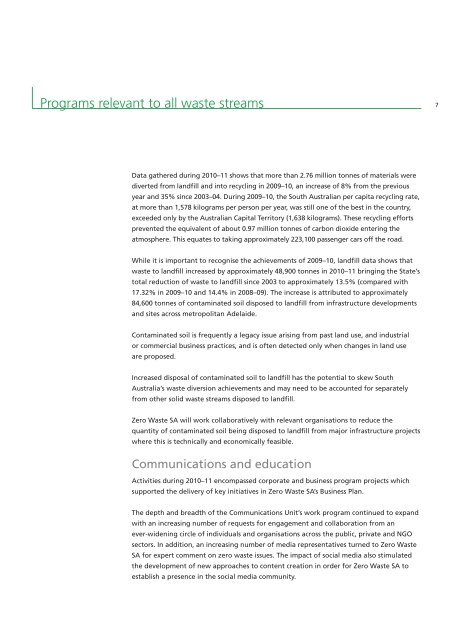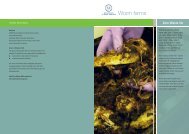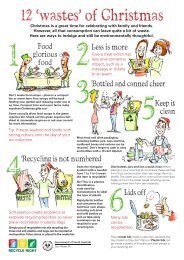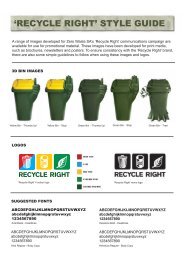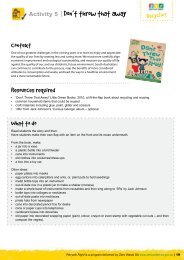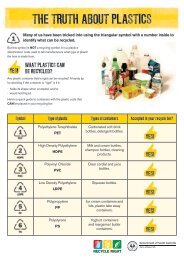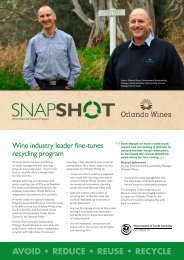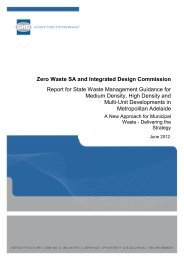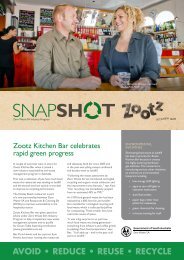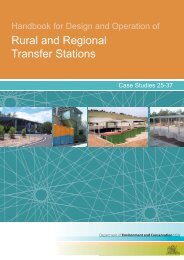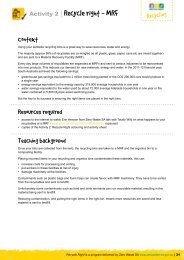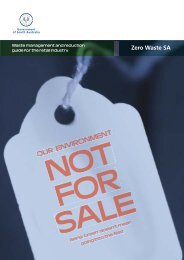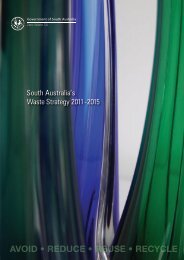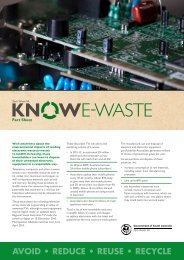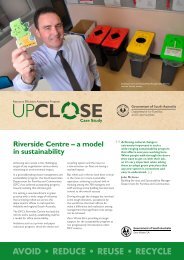Annual Report 2010-11 - Zero Waste SA - SA.Gov.au
Annual Report 2010-11 - Zero Waste SA - SA.Gov.au
Annual Report 2010-11 - Zero Waste SA - SA.Gov.au
You also want an ePaper? Increase the reach of your titles
YUMPU automatically turns print PDFs into web optimized ePapers that Google loves.
Programs relevant to all waste streams<br />
7<br />
Data gathered during <strong>2010</strong>–<strong>11</strong> shows that more than 2.76 million tonnes of materials were<br />
diverted from landfill and into recycling in 2009–10, an increase of 8% from the previous<br />
year and 35% since 2003–04. During 2009–10, the South Australian per capita recycling rate,<br />
at more than 1,578 kilograms per person per year, was still one of the best in the country,<br />
exceeded only by the Australian Capital Territory (1,638 kilograms). These recycling efforts<br />
prevented the equivalent of about 0.97 million tonnes of carbon dioxide entering the<br />
atmosphere. This equates to taking approximately 223,100 passenger cars off the road.<br />
While it is important to recognise the achievements of 2009–10, landfill data shows that<br />
waste to landfill increased by approximately 48,900 tonnes in <strong>2010</strong>–<strong>11</strong> bringing the State’s<br />
total reduction of waste to landfill since 2003 to approximately 13.5% (compared with<br />
17.32% in 2009–10 and 14.4% in 2008–09). The increase is attributed to approximately<br />
84,600 tonnes of contaminated soil disposed to landfill from infrastructure developments<br />
and sites across metropolitan Adelaide.<br />
Contaminated soil is frequently a legacy issue arising from past land use, and industrial<br />
or commercial business practices, and is often detected only when changes in land use<br />
are proposed.<br />
Increased disposal of contaminated soil to landfill has the potential to skew South<br />
Australia’s waste diversion achievements and may need to be accounted for separately<br />
from other solid waste streams disposed to landfill.<br />
<strong>Zero</strong> <strong>Waste</strong> <strong>SA</strong> will work collaboratively with relevant organisations to reduce the<br />
quantity of contaminated soil being disposed to landfill from major infrastructure projects<br />
where this is technically and economically feasible.<br />
Communications and education<br />
Activities during <strong>2010</strong>–<strong>11</strong> encompassed corporate and business program projects which<br />
supported the delivery of key initiatives in <strong>Zero</strong> <strong>Waste</strong> <strong>SA</strong>’s Business Plan.<br />
The depth and breadth of the Communications Unit’s work program continued to expand<br />
with an increasing number of requests for engagement and collaboration from an<br />
ever-widening circle of individuals and organisations across the public, private and NGO<br />
sectors. In addition, an increasing number of media representatives turned to <strong>Zero</strong> <strong>Waste</strong><br />
<strong>SA</strong> for expert comment on zero waste issues. The impact of social media also stimulated<br />
the development of new approaches to content creation in order for <strong>Zero</strong> <strong>Waste</strong> <strong>SA</strong> to<br />
establish a presence in the social media community.


